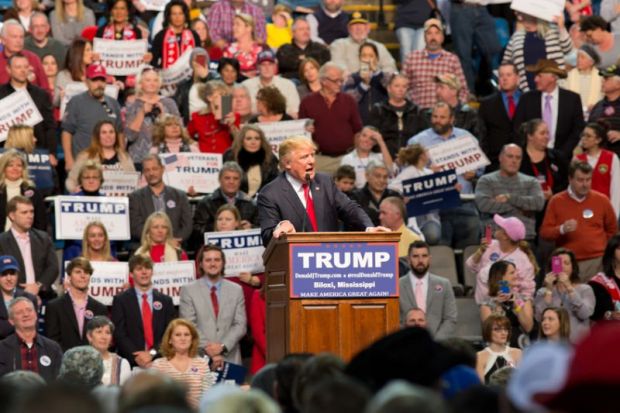Teaching legal studies during this US election season has been a trickier-than-usual balancing act. Students who are usually engaged in robust dialogue and disagreement have been reticent to share their views; class conversation has almost obsessively avoided talk of the presidential candidates. My students seem genuinely bereft at the state of national discourse, and have asked me on several occasions, does politics “always feels this bad?”
In my course on contemporary American Indian law and politics, we have been working hard to think about tribal status, tribal sovereignty and individual Indian identity as related and interconnected, but also separable, things.
My students are writing policy position papers on a range of issues, taking a randomly assigned perspective (tribal government, tribal elder, non-tribal white local, state or federal government official, social movement organisation). I’ve made this assignment both to help them learn about a range of policy issues that we can’t cover in one semester, and to help them see two key things: that Indian people have many of the same political and policy concerns as non-Indian people; and tribal government positions don’t always reflect the political ideologies of the tribal members.
I also hope that the assignment will help them learn to take different perspectives, and see the humanity and good will of people who hold differing views.
In keeping with the goals of my course, and the students’ focus on policies, I asked them to read a set of documents about the policy positions of Hillary Clinton and Donald Trump. I gathered the sources from the candidates’ websites, from American Indian media sources and from national media outlets.
I split the classroom in half, assigned one half to “Trump” and the other to “Clinton”, and asked them to prepare to caucus – we do live in Iowa, after all!
The pro-Clinton students made an absolutely convincing case that she has well-articulated policy positions that support tribal sovereignty, including her stance on tribal jurisdiction in the Violence Against Women Act; her support of the Iroquois Lacrosse team when she was secretary of state; the fact that she has a history of advocating for parts of our policy that include Indian Country: rural America, marginalised Americans, veterans and people of colour; and her support of the United Nations’ Declaration of Rights of Indigenous People.
They added that she has been endorsed by a large number of tribal leaders, as well as major American Indian media. The Clinton group were able to make their argument without much recourse to damning Trump; they were able to rely on the strength of their candidate’s policy positions for Indian Country.
Fortunately for the group I asked to caucus for Trump, their candidate had a newly released policy document, including endorsements from tribal and Indian leaders, that we had not previously seen. Until they found that document, my students agreed, Trump didn’t have a leg to stand on – in fact, his blatant anti-Indian statements seemed to make it impossible to defend his candidacy in Indian Country.
Using his new policy statement, though, as well as some creative reading of his previous statements, the Trump team argued that he was the best candidate for a variety of reasons. First, they argued that he is a protector of the integrity of Indian identity, by refusing to allow “fake tribes” to get past the Bureau of Indian Affairs and into gaming. They also argued that as a candidate who doesn’t like government regulation, Trump would cut bureaucracies that tribes have to deal with at the federal level, and empower them to deal directly with states and service providers.
As a candidate who doesn’t believe that climate change is an issue, and is against the Environmental Protection Agency, he would allow tribes to develop resources on their land as they see fit. And, as a candidate who is anti-union, Trump would recognise tribal sovereignty in employment contracts. And they took the position that tribal governments on the Mexican-American border, who might perceive themselves to be dealing with illicit drug trade, might welcome strong anti-immigration policies.
Indeed, in a moment of welcome levity, they argued that the tribal position might be that “all the immigrants” should be sent back home, dominant white culture members included.
In other words, students began to understand that tribal governments have reasons to support conservative candidates – even when tribal members might not. In the end, a slim majority of the entire class said that if they had to vote as tribal leaders – rather than as American Indians – they would vote Trump.
They also had fun. Students felt empowered by the role-playing to get some things off their chest. They parroted Trump’s attacks on Clinton, hilariously noting that “those deleted emails were probably all about Indian Country”, and interrupting Clinton supporters with the single word: “wrong”.
They argued that Trump “won’t mess up Indian Country because he doesn’t care enough,” and they let off some steam about how it feels to talk in those ways, to hear politics reduced to these attacks. They were able to humanise Trump supporters, and to stop essentialising about American Indian political ideology and identity.
Honestly, when we started the in-class caucus, I expected a quiet slam dunk for Clinton. What I got was a raucous and joyful conversation – and a classroom full of students who learned to see the difference between Indian identity and tribal government and to articulate a range of policy goals for tribal government.
They also were reminded of the importance of humanising supporters of candidates they might abhor, and the joy of focusing on policies not personalities. Come Wednesday morning, I hope they remember those lessons; I believe our democracy depends upon it.
Renee Ann Cramer is professor and chair of law, politics and society at Drake University, Iowa. She is the author of Cash, Color, and Colonialism: the Politics of Tribal Acknowledgment.




